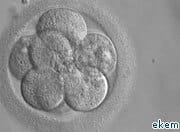The New Scientist magazine is warning that the UK needs to have a “serious debate” about the ethics of a controversial three-parent baby technique.
The publication’s editorial pointed to recent research raising the “ethically troubling prospect” that children conceived through the procedure, called Maternal Spindle Transfer (MST), could “inherit vital traits from three parents”.
The magazine had previously dismissed ethical concerns, but said now it appears “we may have seriously underestimated the influence that mitochondria have”.
Emerging science
The editorial warned that “the emerging science and the issues it raises have not had a proper airing”.
“Up to now, the debate in the UK has focused on safety and efficacy. These matter, of course. But they must now be joined by a serious debate about the ethics”, the editorial said.
“They urgently need to be brought to parliament’s attention, debated and settled before a decision is made”, the editorial concluded.
Genetically modified
Earlier this year, the Government announced its support for techniques to create genetically modified children with three or four parents.
Despite more than 60 per cent of consultation respondents opposing the plans, health minister Jane Ellison said regulations making the procedures legal would be put before Parliament.
If the law is changed, the UK would become the only country in the world to allow the techniques, called Maternal Spindle Transfer (MST) and Pro-Nuclear Transfer (PNT).
Prospective mother
MST involves replacing the nucleus in a healthy donor egg with the nuclear DNA from the prospective mother – resulting in a baby with DNA from three parents (a chromosomal mother, an egg mother and a sperm father).
PNT creates a child from four different individuals (a chromosomal mother, a chromosomal father, an egg mother and a sperm father).

